ICMI Newsletter - September 2022
ICMI Newsletter - September 2022
Editors:
Jean-Luc Dorier (ICMI Secretary General)
Merrilyn Goos (ICMI Vice President)
Lena Koch (ICMI Administrative Manager)
The ICMI Newsletter has new publishing dates:
15th March, 15th June, 15th September, 15th December
CONTENTS
1 Editorial – From the desk of Núria Planas, member of ICMI EC 2021-2024
2 Launching the 26th ICMI Study
3 ICME-15 Progress update
4 News from IMU GA and ICM2022 by Carlos Kenig, IMU President and Helge Holden, IMU Secretary General
5 Call for ICMI Awards
6 Last updates in AMOR
7 Good news about ICMI Digital Library Project
8 News from ICMI Country representatives and Affiliate organizations
8.1 News from the ICMI Representant from Indonesia Dr Unsri Zulkardi
8.2 Report on MERGA 44
8.3 Report on PME 45
8.4 Report on the third conference of ADiMA
9 Conferences to come
1. Editorial
From the desk of Núria Planas, member of ICMI EC 2021-2024
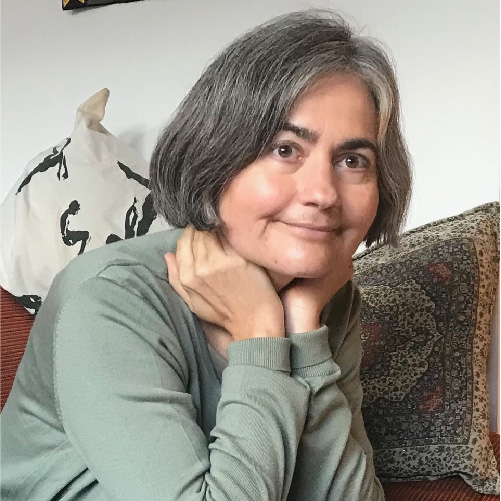 I am honored and excited to be part of the strong team of the 2021-2024 Executive Committee of ICMI as Member-at-Large, and honored and excited by the opportunity to contribute to this Newsletter Editorial!
I am honored and excited to be part of the strong team of the 2021-2024 Executive Committee of ICMI as Member-at-Large, and honored and excited by the opportunity to contribute to this Newsletter Editorial!
‘To attend ICME-9 or not to attend’ was the Hamlet-question for me in 1999. In a visit to Universitat Autònoma de Barcelona, Alan Bishop recommended a big YES. So, I went to Makuhari, Japan, as a PhD student, and learned that the community of mathematics education was even bigger than expected. That July, on the excursion day I met a woman called Megan Clark, from Aotearoa / New Zealand, who spontaneously invited me to participate in a meeting of the International Organization of Women and Mathematics Education (IOWME). Today, one of my responsibilities as Member-at-Large is serving as the EC liaison person for IOWME, an ICMI Affiliate Thematic Organization. This is a responsibility that I see linked to my research and life interests in the educational opportunities of groups that historically have been underprivileged for a variety of reasons.
What it is to be a woman in academia, for example, varies across countries and cultures, and intersects with other aspects of our identities such as being or not a rural migrant, a single mother, a ‘native’ speaker of an international world language…, which altogether raise issues for broader equity discussions in research and other sites of practice in mathematics education. Last December 2021, Jennifer Hall and Eva Norén, in their role of representing IOWME, co-edited an excellent Mathematics Education Research Journal special issue titled ‘Innovations in “gender issues” research in mathematics education.’ The articles in the special issue address different sites of practice in mathematics education, and some of the authors refer to their own interpreted as gender-related experiences and challenges in the research community. At my place, it is more and more common to attend faculty meetings and to find the table made up entirely of female professors. I then feel that it is an interesting time and context for being a woman in academia, though this is simplistic.
Participation in IOWME, in its quadrennial meetings at ICME and through the lively discussions and interchanges on its Facebook international forum at https://www.facebook.com/groups/247108762072768, provides information, ideas, experiences, and insights into research projects, policy documents, and curriculum development concerning gender and mathematics. Anyone with interest in equity issues in mathematics education can ask to join IOWME, as well as follow the associated Committee of Women in Mathematics (CWM) of the IMU, specifically concerned with activities related to the visibility of women in mathematics worldwide. For joining or considering joining IOWME, you can contact Jennifer Hall, , and Vanessa Neto, , the current IOWME convenors. You can also contact ex-convenor Eva Norén, , for letting IOWME know of any recent publication or document that might be worth adding on https://www.mathunion.org/icmi/organisation/affiliated-organisations/iowme.
As in July 2021 at ICME-14, an afternoon is planned at ICME-15 in Sydney with a 120-minute timeslot reserved for the parallel meetings of the Affiliate Organizations, IOWME in particular. July 2024 is not that far away in time, but I encourage you to start learning about or getting involved in IOWME’s initiatives and atmosphere. That said, at ICME-14, I found myself in the difficult position of having to choose between virtually participating in the IOWME room or in the CIEAEM room, and decided to spend 60 minutes with each group. I am also the ICMI EC liaison person for the Commission Internationale pour l’Etude et l’Amélioration de l’Enseignement des Mathématiques (CIEAEM). Hence, it is a bit unfair to finish these lines without noting and valuing the work of this Affiliate Organization. It is clear for me that both IOWME and CIEAEM are instances of inspirational, historical ICMI activity. I am just thinking from my desk that perhaps you will be reading this Editorial by the time when CIEAEM 74 will be announced for Summer 2023. You might contemplate attending it and re-experiencing the reasons why we go to conferences. I will.
2. Launching the 26th ICMI Study
I am happy to announce that an ICMI Study on geometry learning and teaching is being launched. We had an ICMI study on geometry teaching (Study 9), but that was launched nearly 30 years ago, and the scene in geometry learning and teaching has changed substantially since then. Study 26 will encompass different research paradigms such as psychological aspects of spatial reasoning and visualization, embodied cognition and geometrical, spatial, or visual reasoning, etc. The study will look at curriculum issues and teaching approaches, covering different educational levels from preschool to tertiary education in different contexts and cultural traditions around the world. Study 26 will also look at the impact of digital technologies on the learning and teaching of geometry, including contexts with limited or no technology resources available. Other issues such as professional preparation and development of geometry teachers, connections of geometry with other disciplines and professions, ethnomathematics and indigenous ways of understanding geometry, and the impact of neurosciences in informing us on mental processes related to geometry, spatial reasoning, and visualization will also be covered. In sum this is a comprehensive and ambitious study.
We are very happy and grateful that two eminent scholars working in this area of research have agreed to serve as Co-Chairs to lead the study. They are Angel Gutierrez from University of Valencia, Spain and Tom Lowrie from University of Canberra, Australia. An international program committee (IPC) for the study is in the process of being formed, and Tom and Angel are arranging for an IPC meeting to take place very soon, when the different aspects of the study will be mapped out. One important product of the IPC meeting is a Discussion Document (DD) which details the study. The DD will be disseminated widely, and educators around the world will be invited to react to the DD. The co-chairs will also reach out to scholars in the field and invite them to join the study conference. In the meantime, if you have any views or suggestions on this Geometry Study, please feel free to contact Angel () or Tom ().
Frederick Leung
President, ICMI
3. ICME-15 Progress update
We’ve been working hard since June sending out invitations for Plenary Panels, Plenary and Invited Lectures, and Topic Study Groups (TSGs) for ICME-15, and there’s more yet to come! I would like to thank all those who have responded promptly to invitations.
The members of the IPC have been providing great support to the organising team and I thank them for their work. We’re looking forward to catching up in person at the second IPC meeting, which will be held in Sydney in February 2023.
We’ve also been working on raising awareness of ICME-15 across the globe and sharing all the benefits of participating in ICME-15. In June we held the Indonesia Information Session via Zoom meeting with nearly 100 colleagues from all over of Indonesia — their interest and enthusiasm was most encouraging.
We also recently released our first electronic newsletter, which is also available on the ICME-15 website in case you missed it. Have a read and share it with your colleagues.
The First Announcement for ICME-15 will be released in early October and will include the details of our Plenary and Lecture speakers, TSGs, information about how you can contribute to TSGs, and how to submit a proposal for a Workshop or Discussion Group. We’ll also announce tentative registration fees.
ICME-15 will be the first time in eight years that the international community of mathematics educators has been able to get together in person, and we’re looking forward to seeing you all.
Make sure you complete the Expression of Interest form on the ICME-15 website to stay up to date with the latest news on the Congress.
Kim Beswick, Convenor ICME-15, Chair IPC,
15th International Congress on Mathematical Education
7-15 July 2024, ICC Sydney Australia
ICME15.com
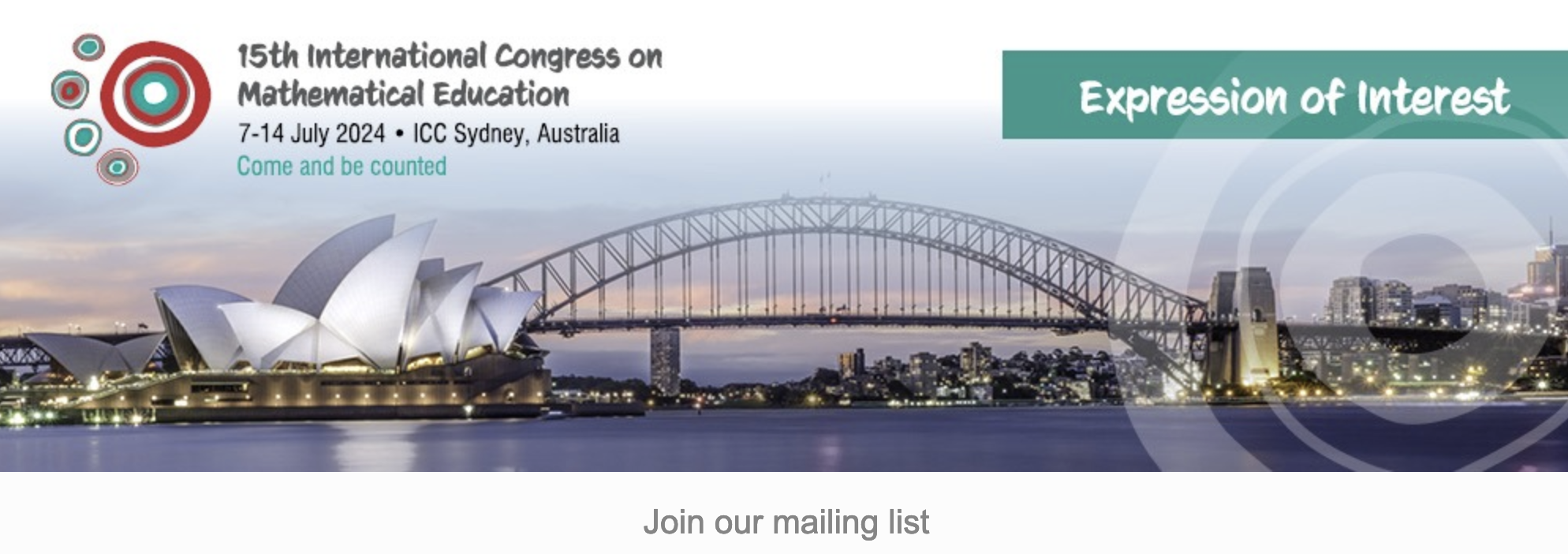
4. News from IMU
News from IMU GA and ICM2022 by Carlos Kenig, IMU President and Helge Holden, IMU Secretary General
One month after the completion of the first ever virtual ICM, we can now look back, and draw some conclusions.
ICM 2022 was originally scheduled to take place in Saint Petersburg, Russia, over 6–14 July. The brutal and unprovoked Russian invasion of Ukraine made it clear to the IMU Executive Committee (EC) that the ICM could not take place as planned. By coincidence, the EC had its annual meeting scheduled for 24–27 February, and we decided that we would organize ICM 2022 as a fully virtual congress on the same dates as originally planned, without any financial support from Russia or any Russian government involvement. Participation should be free and open to all and follow a traditional time schedule, with full days of lectures according to the CEST time zone. Prior to the ICM, we wanted to host the first in-person Award Ceremony in the history of the IMU, at which all the coveted IMU prizes would be announced and handed over. That left the IMU EC with four months to organize a fully virtual ICM without any additional financial or human resources. Fortunately, the speakers had been selected, and the program had been set up. To cut a long (and hectic) story short, we were able to host the ICM as a fully virtual congress. Despite some nerve-racking days just before the opening of the ICM, when the system suffered a critical breakdown, we think the congress went very well – but admittedly we are not neutral observers!
Speakers were given the option of prerecording their lectures or presenting them live (with a prerecorded back-up). Many chose to give their lectures in front of a live audience locally, and clearly our experience gained from two years of remote teaching due to the COVID-19 pandemic improved the quality of the lectures considerably! All lectures were also immediately published to the IMU YouTube channel, and to date the lectures have been seen by more than 500,000 viewers!
Prior to the ICM, the IMU hosted its General Assembly (GA). We accepted a generous offer from Finland to host the GA in Helsinki. With 165 participants in Helsinki, and about 30 participating remotely, we were able to carry out the regular and important business of the Union, setting the pace and direction for the coming four years. On the day after the GA and before the ICM, we held the Award Ceremony in Helsinki, with all four Fields Medalists, the IMU Abacus Medalist, and the Leelavati Prize recipient present in Helsinki. It was a great event, opened by the President of Finland.
Our experience is related, but not identical, to what ICMI experienced. ICME–14, scheduled for July 2020 in Shanghai, had to be postponed due to the pandemic. It was. However. successfully carried out as a hybrid congress one year later, in July 2021 in Shanghai. The GA of ICMI had already been carried out in 2020 as a fully virtual event with a reduced program, including the use of electronic voting for its elections. The IMU took advantage of the experience ICMI gained with electronic voting, and we chose to use the same system, which worked perfectly.
What can we learn from our unexpected experience? For the GA, it seems clear that the meeting will have a definite hybrid structure also in the future. Most participants wanted to participate in person, but the increasing concerns about the consequences of global travel will result in a sizeable fraction of remote participants. Our experience is, however, that in-person meetings most certainly produce better discussions and decisions. Electronic voting will from now on undoubtedly be the way to carry out the very time-consuming, paper-balloting of the past. Device-independent and robust software, reliable internet, and the fact that all delegates have access to modern devices, have made electronic voting the preferred choice.
As for the congress, the unwanted experience we gained from this year’s ICM should be analyzed in detail by the IMU EC as well as the ICM Structure Committee. We will not anticipate what their conclusions will be. But we want to emphasize the formidable success of making all lectures available instantly on YouTube, and we consider this a feature which should be continued for future ICMs.
But what is clear is that – as decided by the GA – ICM 2026 will be hosted in Philadelphia, USA, over 22–29 July 2026, preceded by the GA in New York City on 19–20 July 2026. We look forward to these events with great anticipation!
5. Call for Nominations for ICMI Awards
Call for Nominations for the 2024 ICMI Emma Castelnuovo Award
Deadline for nominations: 30th November 2022
The Emma Castelnuovo Award recognizes outstanding achievements in the practice of mathematics education consistent with ICMI’s principles:
- the development of mathematical education at all levels and;
- the promotion of reflection, collaboration, exchange, and dissemination of ideas on the teaching and learning of mathematics from the primary to the university level.
The Emma Castelnuovo Award honors an individual, or a small team of individuals, for work in the development and implementation of exceptionally excellent and influential work in the practice of mathematics education related to one or more of the following:
- classroom teaching
- curriculum development
- instructional design (of materials or pedagogical models)
- teacher education programs, and/or
- field projects with a demonstrated influence on schools, districts, regions, or countries.
More information can be found on the Emma Castelnuovo Award page on ICMI's website.
Call for Nominations for the 2024 Felix Klein and Hans Freudenthal Awards
Deadline for nominations: 30th November 2022
The two awards recognize outstanding accomplishments in mathematics education research:
- Felix Klein Award recognizes lifelong achievement in mathematics education research,
- Hans Freudenthal Award recognizes a major program of research on mathematics education.
Felix Klein Award
The Felix Klein medal is awarded for life-time achievement in mathematics education research. This award acknowledges senior scholars who have made field-defining contributions over their professional careers. Awardees will have had an impact both at the national level, within their own countries, and at the international level. We have valued in the past those candidates who not only have made substantial research contributions, but also have introduced new issues, ideas, perspectives, and critical reflections. Additional considerations have included leadership roles, mentoring, and peer recognition, as well as the actual or potential relationship between the research done and improvement of mathematics education at large, through connections between research and practice.
Hans Freudenthal Award
The Hans Freudenthal medal acknowledges the outstanding contributions of an individual’s theoretically robust and coherent research program, which has had a clear impact on our research community. It honors a scholar who has initiated a new research program and has brought it to maturation over the past 10 years. Freudenthal awardees should also be researchers whose work is ongoing and who can be expected to continue contributing to the field. In brief, the criteria for this award are depth, novelty, sustainability, and impact of the research program.
As of 2024 all three awards will be given quadrennially, during the year that an ICME is held.
More information can be found on the awards page on ICMI's website.
We recognize that it’s a lot of work to put together a compelling nomination, but please do!
The two ICMI Awards Committees can only choose recipients from officially submitted nominations for the current round, accompanied by full documentation.
Thank you for considering this call seriously. We look forward to receiving your nominations.
Prof. Em. Helen Forgasz and Prof. Alan Schoenfeld
on behalf of the ICMI Emma Castelnuovo Awards Committee and the ICMI Klein and Freudenthal Awards Committee
6. AMOR
Last updates in AMOR
 In 2017, the International Commission on Mathematical Instruction (ICMI) launched the project ICMI AMOR (ICMI Awardees Multimedia Online Resources) https://www.mathunion.org/icmi/awards/amor. The project was initiated by Jean-Luc Dorier and, since then, it has aimed at building online resources reflecting highly significant and influential research in mathematics education at an international level. The R of AMOR particularly stands for independent units consisting of a series of video modules, with each unit devoted to one mathematics education researcher who was honored with the Felix Klein Award or the Hans Freudenthal Award. The Emma Castelnuovo Awardees are also in the process of being integrated in the project.
In 2017, the International Commission on Mathematical Instruction (ICMI) launched the project ICMI AMOR (ICMI Awardees Multimedia Online Resources) https://www.mathunion.org/icmi/awards/amor. The project was initiated by Jean-Luc Dorier and, since then, it has aimed at building online resources reflecting highly significant and influential research in mathematics education at an international level. The R of AMOR particularly stands for independent units consisting of a series of video modules, with each unit devoted to one mathematics education researcher who was honored with the Felix Klein Award or the Hans Freudenthal Award. The Emma Castelnuovo Awardees are also in the process of being integrated in the project.
The Units featuring Michèle Artigue, Guy Brousseau, Yves Chevallard, Celia Hoyles and Anna Sfard, in different stages of development from finalized to initiated, are currently available on the AMOR website. The Unit of Celia Hoyles is the most recent, now consisting of the introductory Module O presented by Núria Planas, followed by three modules presented by Celia Hoyles. Anna Sfard’s unit has been just recently totally achieved with Module 0 presented by J-L. Dorier and 8 modules presented by Anna herself. Michèle Artigue’s unit is complete, with module 0 presented by J.-L. Dorier and 9 modules presented by Michèle herself. Yves Chevallard’s unit is nearly complete, with module 0 presented by J.-L. Dorier and 8 modules (one is missing still) presented by Marianna Bosch. Finally, Guy Brousseau’s unit should be finished soon: for the moment there is module 0 by J-L. Dorier and 6 modules by Claire Margolinas and Annie Bessot. An additional 3 or 4 more modules are expected soon.
Alongside work on started Units, the AMOR team within the ICMI Executive Committee works on the preparation of newer Units. In deciding who to work with, we consider the Award year but also the time availability of the awardees or of close collaborators.
7. Digital Library Project
Good news about ICMI Digital Library Project
ICMI is very eager to make as many as possible of its past and recent publication accessible via online open access.
The good news is that after long negotiations, we will be able to make all ICME proceedings accessible very soon.
We also have now the rights for the first 5 ICMI Studies (which are available open access on the ICMI Website here) and we have engaged a process with Springer for all the following ICMI Studies which will be progressively published online open access.
We will keep you informed regularly of our progress in these matters.
8. News from our community
News from ICMI Country representatives and Affiliate organizations
8.1. IndoMS-JME
News from the ICMI Representant from Indonesia Dr Unsri Zulkardi
I hope this journal can help ICMI members around the world to publish their manuscripts.
Journal on Mathematics Education (IndoMS-JME) is a peer-refereed open-access international journal that has been established for the dissemination of state-of-the-art knowledge in the field of mathematics education. Starting from 2022, IndoMS-JME would be published four times a year. All submitted papers must present new ideas and developments of major importance in mathematical education and reflect the variety of research concerns within the field and the range of methods used to study them. This journal only publishes articles dealing with didactical, methodological and pedagogical subjects, rather than with specific programs for teaching mathematics.
Journal Description
Journal title : Journal on Mathematics Education
Abbreviation : J. Math. Educ.
ISSN : 2407-0610 (e) 2087-8885 (p)
Editor-in-Chief : Prof. Dr. Zulkardi, M.IKomp., M.Sc. DOI Prefix : 10.22342
Type of peer-review : Double-blind
Indexing : Scopus and view more
Journal Rank : CiteScore - Q1 (General Mathematics and Education)
Publishing Model : OA, Author-Pays
Publisher : Universitas Sriwijaya in collaboration with Indonesian Mathematical Society (IndoMS)
8.2 Report on MERGA 44
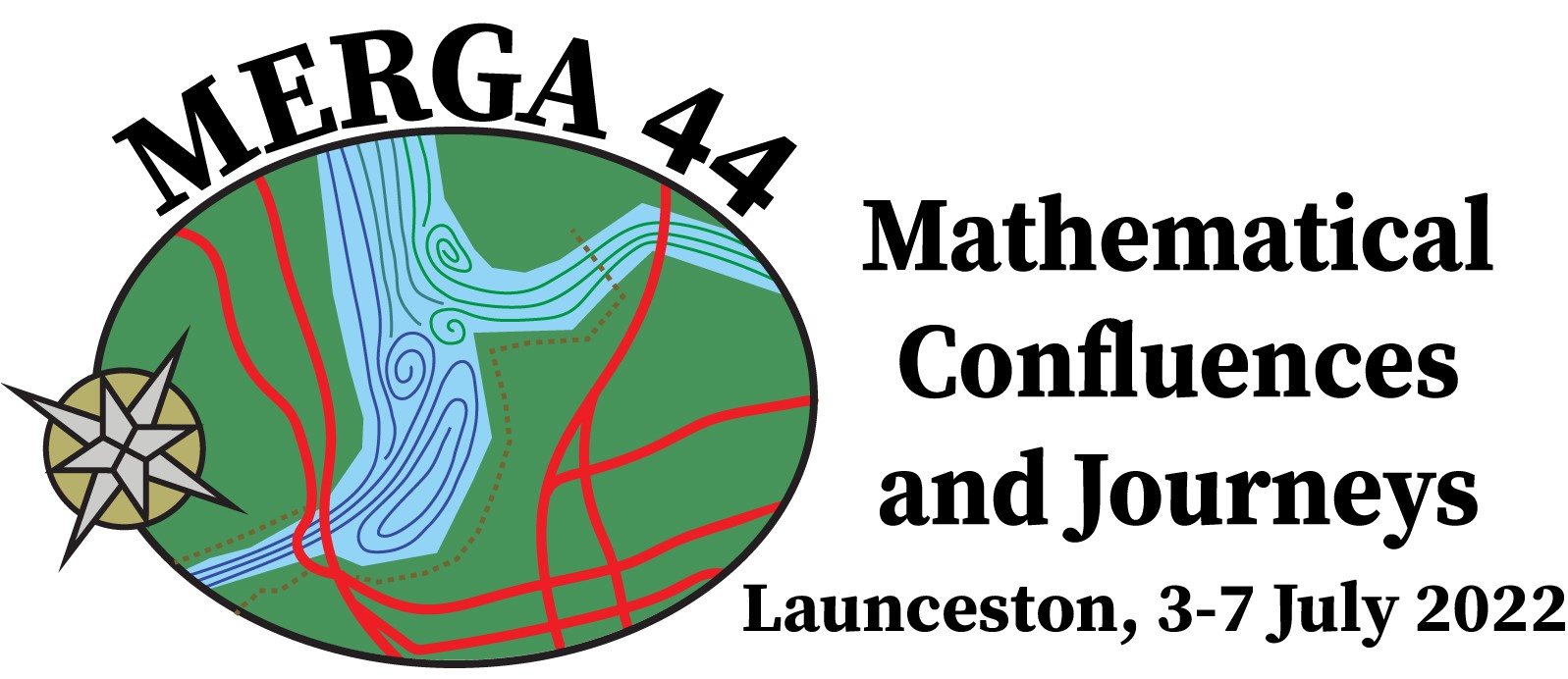
The 44th annual conference of the Mathematics Education Research Group of Australasia was held in Launceston from 3-7 July 2022. This was the first in-person MERGA conference since 2019, with the 2020 conference being postponed to 2021 and held online due to the Covid pandemic. Delegates enjoyed stimulating keynote addresses from Peter Grootenboer, Peter Liljedahl, and Elena Nardi along with the usual program of research reports, symposia, workshops, and short communications. An innovative “happy hour” was held to capture MERGA’s oral history from longstanding members in preparation for the 50th anniversary conference. The conference also celebrated the election of the next President, Katie Makar, and the award of the Career Research Medal to Merrilyn Goos for sustained and distinguished achievement in mathematics education research.
8.3. Report on PME 45
A successful, onsite PME45 in Alicante/Alacant (18-23 July, 2022)
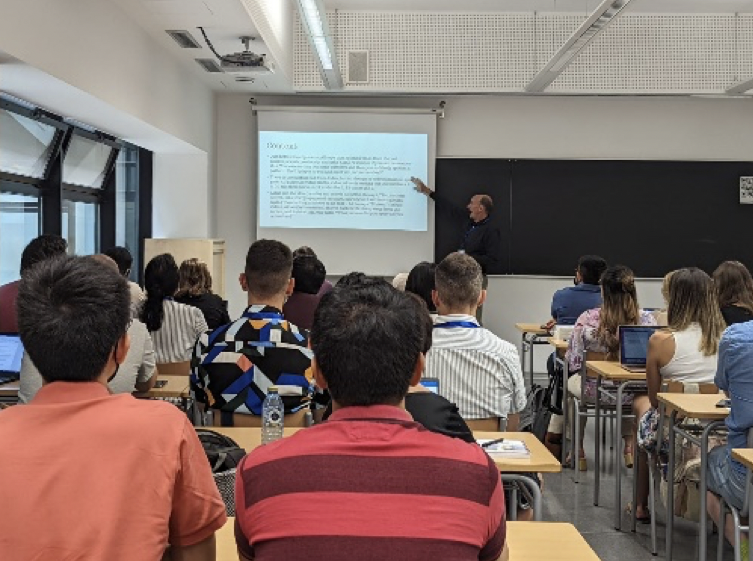 I would have loved to experience three 1977 events first-hand: to attend the first quadraphonic concert by Pink Floyd in London; to vote in the first democratic elections in Spain after forty years of dictatorship; and to travel to Utrecht in The Netherlands for participation in PME1, the First Conference of the International Group for the Psychology of Mathematics Education! Forty years have passed since then and a strong research community has been built around the PME annual conferences. The unprecedented circumstances of the Covid-19 pandemics disrupted the plans for PME44 in Khon Kaen, Thailand in 2021, but the community and the local organizers were strong enough to conduct a successful virtual conference. PME45 in Alicante/Alacant, Spain developed with the relief and joy of having recovered some ‘normality’ thanks to 524 onsite participants from 48 countries and uncountable home-language backgrounds. The possibility of cancellation of the onsite event was not discarded for months, and the local committee faced the responsibility of anticipating multiple scenarios. We hoped for the best, and everything went well. The majority of registered participants could attend the conference. We missed, however, those who could not travel or who decided not to travel for health reasons, but also those who could not travel because of financial issues, visa restrictions, armed conflicts, and other reasons.
I would have loved to experience three 1977 events first-hand: to attend the first quadraphonic concert by Pink Floyd in London; to vote in the first democratic elections in Spain after forty years of dictatorship; and to travel to Utrecht in The Netherlands for participation in PME1, the First Conference of the International Group for the Psychology of Mathematics Education! Forty years have passed since then and a strong research community has been built around the PME annual conferences. The unprecedented circumstances of the Covid-19 pandemics disrupted the plans for PME44 in Khon Kaen, Thailand in 2021, but the community and the local organizers were strong enough to conduct a successful virtual conference. PME45 in Alicante/Alacant, Spain developed with the relief and joy of having recovered some ‘normality’ thanks to 524 onsite participants from 48 countries and uncountable home-language backgrounds. The possibility of cancellation of the onsite event was not discarded for months, and the local committee faced the responsibility of anticipating multiple scenarios. We hoped for the best, and everything went well. The majority of registered participants could attend the conference. We missed, however, those who could not travel or who decided not to travel for health reasons, but also those who could not travel because of financial issues, visa restrictions, armed conflicts, and other reasons.
The theme of this year’s PME international conference focused on the fundamental relationship (and complementarity) in mathematics education between research and practice, ‘Mathematics education research supporting practice: Empowering the future.’ Jill Adler and Jinfa Cai, in inspirational reactions to plenaries, and Laurinda Brown, in an excellent plenary, invited us to explore the many challenges inherent in the two-way relationship, research supporting practice and practice supporting research, and in the collaborations between researchers and practitioners. It is largely a PME and ICMI mission to facilitate the research-practice dialogue in ways that support research development and improve educational practice. Indeed, a few PME45 participants, mostly within the group of newcomers, introduced themselves as school teachers who were engaged in research projects and developmental work. We could learn much from listening to researcher-practitioner experiences and insights as to, for example, how teaching practice can be designed based on research evidence, and then more questions for research can be raised. The question guiding the Oxford-style plenary panel, smartly chaired by Olive Chapman, went even one step further in situating mathematics education research and practice in relation to the world we live in, for its future and the future of its people: ‘Should mathematics teacher education be responsive to a rapidly changing world?’
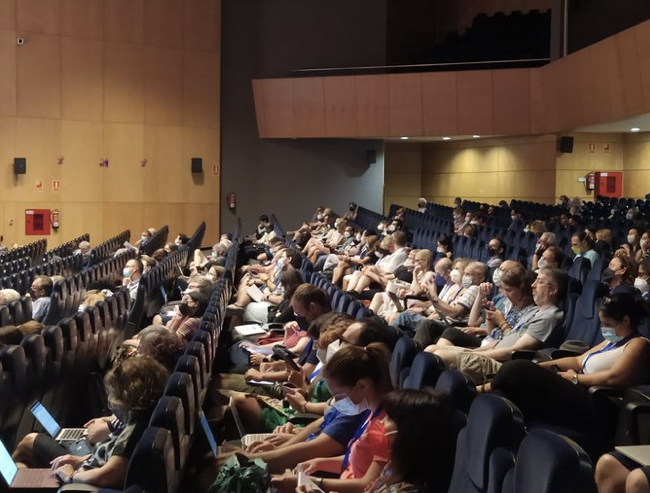 At this point in time, I have participated in a total of 12 PME Conferences starting with PME26 in Norwich, United Kingdom. I never before perceived such a widespread concern around today’s social and ecological world problems and the role of mathematics education and mathematics educators in finding practical ways of reducing the expansion and impact of these problems. This concern was present at various levels, in considerations raised during the Policy Meeting, the General Assembly, the Plenary Panel…, in the research topics of a number of Research Reports, Oral Communications and Posters, in the conversations in-between intense timeslots of work… There was a comment in the Policy Meeting that keeps resonating in my thinking. It was heard more or less as follows: Is the PME international community ready for facilitating active membership to those who will decide or have already decided not to travel, or not to travel too much, for ecological reasons? Following on from this comment, it seems clear that the ecological cost to having onsite annual PMEs is a lot more worrying than we may estimate. But which is a response, in this precarious world, that also considers the academic cost of hybridizing or settling a virtual conference culture? Or still, what may it mean to renew our passion for mathematics education in forms that are socially and ecologically responsive, with the potential to impact on curricular, educational, research and policy practices? We will need to find out.
At this point in time, I have participated in a total of 12 PME Conferences starting with PME26 in Norwich, United Kingdom. I never before perceived such a widespread concern around today’s social and ecological world problems and the role of mathematics education and mathematics educators in finding practical ways of reducing the expansion and impact of these problems. This concern was present at various levels, in considerations raised during the Policy Meeting, the General Assembly, the Plenary Panel…, in the research topics of a number of Research Reports, Oral Communications and Posters, in the conversations in-between intense timeslots of work… There was a comment in the Policy Meeting that keeps resonating in my thinking. It was heard more or less as follows: Is the PME international community ready for facilitating active membership to those who will decide or have already decided not to travel, or not to travel too much, for ecological reasons? Following on from this comment, it seems clear that the ecological cost to having onsite annual PMEs is a lot more worrying than we may estimate. But which is a response, in this precarious world, that also considers the academic cost of hybridizing or settling a virtual conference culture? Or still, what may it mean to renew our passion for mathematics education in forms that are socially and ecologically responsive, with the potential to impact on curricular, educational, research and policy practices? We will need to find out.
Núria Planas, PME45 Local Committee and Member-at-Large of the ICMI EC
8.4 Report on the third conference of ADiMA
ADiMA3 – The 3rd Conference of the Association de Didacticiens des Mathématiques Africains took place in Tunisia at Hammamet - 15 au 20 August 2022 - on the auspice of l’Association Tunisienne de Géomatique (ATG) and l’Université de Tunis el Manar (UTM)

The theme of the conference was; “Interdisciplinary approach in the teaching and learning of mathematics: what projects and what issues for Africa?”
With 4 Sub-themes:
1. 1. The relationship between mathematics and the concrete, mathematics and other disciplines,
2. 2. Conditions for the realization of the interdisciplinary project
3. 3. Teacher training and the interdisciplinary project
4. 4. Historical, epistemological, philosophical, ideological and cultural dimensions in the interdisciplinary project
The conference gathered 64 participants from Algeria, Benin, Brazil, Canada, Cameroun, Democratic Republic of Congo (RDC), Congo (Brazzaville), France, Greece, Ivory Coats, Mali, Morocco, Niger, Palestine, Portugal, Senegal, Switzerland, Tunisia.
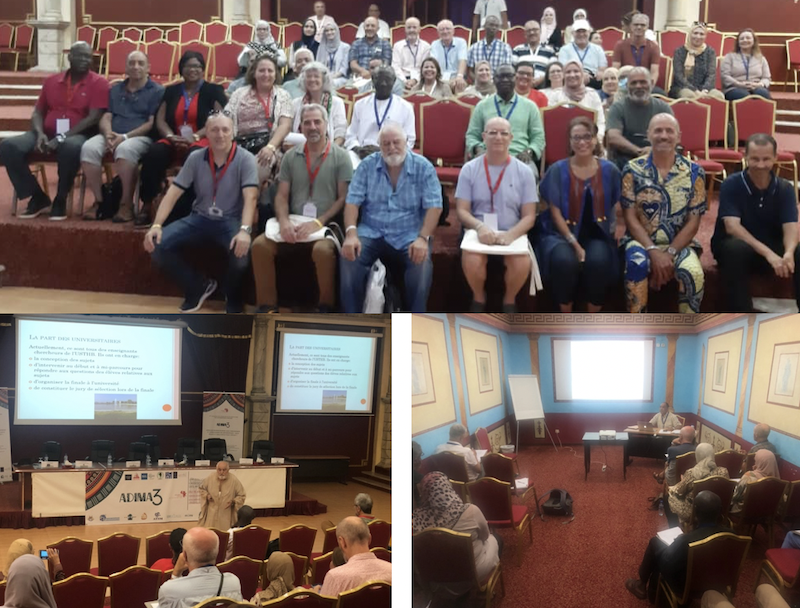
The new Executive Bureau of ADiMA was elected during the General Assembly of the Association with an enlarged committee in charge of proposing new organizational and governance structures.
The next ADiMA Conference will take place in 2024 in Morocco.
9. Conferences to come
ICHME-7
Seventh International Conference on the History of Mathematics Education (ICHME-7)
Dates: September 19. – 23, 2022
Location: University of Mainz, (Germany)
More information can be found on the conference website.
MCG12
12th International Mathematical Creativity and Giftedness Conference (MCG12)
The conference will be held for only the second time in the United States, in Las Vegas, Nevada, September 25 – 28, 2022. Considered the premier conference of its type in the world, this conference will have a focus on mathematical expertise and innovation. The opening session on Sunday will feature Karl Schaffer and Erik Stern. With a special focus on thorough, yet playful, integration of dance and mathematics, their presentations at the conference will include opportunities to experience physical, creative problem solving, as well as sharing insights that they have gained through their work together and separately. Keynote speakers include Yeap Ban Har from Singapore, Zalman Usiskin from the United States, and Marianne Nolte from Germany.
Electronic proceedings will be available prior to the conference.
See the conference website for more information.
Contact Linda Sheffield () with any questions.
CIBEM IX
CIBEM – Congresso Iberoamericano de Educação Matemática / Iberoamerican Congress of Mathematics Education (CIBEM)
CIBEM IX will be held in the city of Sao Paolo, scheduled for December 5 to 9, 2022.
IX CIBEM is planned as a space open to all current perspectives, theoretical and conceptual approaches that permeate both empirical work and theoretical reflection of those who practice Mathematics Education.
The expected number of participants is 1200, awaiting the attendance of researchers, professors and undergraduate and graduate students interested in Mathematics Education.
Find out more on the CIBEM website.
EMF 2022
Espace Mathématique Francophone (EMF 2022)
Conference Language: French
The next conference of the Espace Mathématique Francophone (EMF 2022) will take place from Monday 12 to Friday 16 December, 2022 in Cotonou (Bénin) and will be preceded by the youth project from Thursday 8 to Sunday 11 December, 2022.
Depending on the evolution of the pandemic, it is possible that some of the scheduled activities will take place in hybrid mode. The local organizing committee is studying this possibility and is trying to find ways to make it work.
We will keep you informed of the evolution of this organization.
More information can be found on the EMF 2022 website.
CIAEM/IACME XVI
CIAEM (Conferencia interamericana de educacion mathematica)/ IACME Inter-American Conference on Mathematics Education
CIAEM/IACME XVI will be held from July 30 -August 4, 2023 in Peru, at the University of Lima, in person.
The deadline to submit proposals for workshops, presentations and posters is between September 1 and October 30, 2022. https://xvi.ciaem-iacme.org/ponencias-abiertas/
More information can be found on the CIAEM website.
CERME13
CERME13, will take place in Budapest, Hungary from July 9 until 14, 2023, 1½ years after CERME12 and 1½ years before CERME14, planned in February 2025. Find out more about CERME13 here.